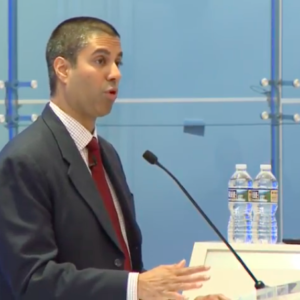President Donald Trump’s pick to lead the Federal Communications Commission reflected on his first 100 days on the job Friday, ticking off an FCC agenda that’s been as partisan as bipartisan, and left consumers and the telecommunications industry divided.
“By any objective measure, we’ve hit the ground running and have had a very productive three-plus months at the commission,” Pai told a crowd at the American Enterprise Institute in Washington. “Just one data point: In my first 100 days, the FCC adopted 49 items. To put that number in perspective, during the prior two permanent chairmen’s first 100 days, the commission adopted 25 and 34 items.”
Many items, like releasing the text of items before they’re voted on, allocating billions to support wireless and broadband deployment, tackling robocalls, and fining long-distance carriers for fraud, stretch across the partisan divide. Others, such as closing an investigation into zero-rating offers the previous FCC deemed discriminatory and suspending transparency requirements associated with net neutrality, cater to the right.
“Paperwork aside, we’re reviewing the FCC’s rules across the board and deciding which ones still make sense in the digital age,” Pai said. “As part of this review, we’re asking whether the costs of a rule outweigh the benefits. When the facts warrant, we won’t hesitate to revise overly burdensome rules or repeal them altogether. And you don’t need a weatherman to know that the wind is blowing certain FCC rules toward modification or elimination.”
While Pai has stepped up efforts to grow broadband networks in poor and rural areas like upstate New York, approve new technologies like LTE-U, and increase agency transparency, he’s received no shortage of criticism for easing regulations on business broadband providers that critics say facilitate monopolies and duopolies, letting broadcasting conglomerates buy more channels, and suspending providers from a program that provides phone and internet subsidies to poor Americans.
The majority of those efforts are aimed at the primary goal of closing the digital divide, according to the chairman. While his predecessor, former Chairman Tom Wheeler, was focused on big providers having too much power and influence, Pai’s focused on small providers having too many regulatory requirements and not enough support.
“Here’s one statistic that gives you a sense of how real and significant those costs are,” he said. “According to the Office of Management and Budget, the FCC imposes $800 million a year in paperwork burdens.”
That money, which doesn’t include personnel costs to fill out the forms or any other FCC regulatory costs, would be better spent on “delivering American consumers better, faster, cheaper internet access,” Pai believes, than “lawyers and accountants figuring out how to comply with FCC rules.”
“That’s especially true for small businesses,” he said. “Federal regulations have a disproportionate effect on these businesses. These companies are often the linchpin of a more competitive marketplace, and they don’t have the resources to withstand a regulatory onslaught. I’m very sensitive to the impact regulations can have on such businesses.”
The chairman made no mention of his biggest regulatory rollback yet: net neutrality, which the agency will vote to begin repealing on May 18.
Last week Pai, said more than 20 small broadband providers wrote to him asking for a repeal of the rules, saying it’s been harder to secure financing to grow their networks since they were put in place. Another group of small provider members of USTelecom, a trade group that also represents large providers like AT&T and Verizon, sent a letter to the chairman this week asking him to stay strong on his repeal effort.
“We encourage you to keep your focus on closing the digital divide, and we will do everything we can to support this important work,” the letter reads. “Key to this effort is the initiative you began last week to ensure broadband companies can continue to invest vigorously in stronger, faster networks for consumers, free from the bureaucratic straightjacket of outdated regulations known as Title II.”
Letter signatories said they were predominantly family-owned business counting their customers in the thousands and even hundreds, who believe in the “open internet” and “would never consider acting contrary to the interests of our customers.”
“Rural America urgently needs a smarter and more practical approach than rules based on laws written when our grandparents were stringing the countryside with copper and even cattle wire to connect neighbors on old party line telephones,” they wrote. “A clean, modern framework would accomplish two things: clear, unequivocal net neutrality protections for consumers; and equally clear, unequivocal regulatory certainty for companies working to bring broadband’s benefits to everyone.”
After announcing his plan last week, Pai warned opponents of his plan, of which there are many, to “make no mistake about it: this is a fight that we intend to wage and it is a fight that we are going to win.”

